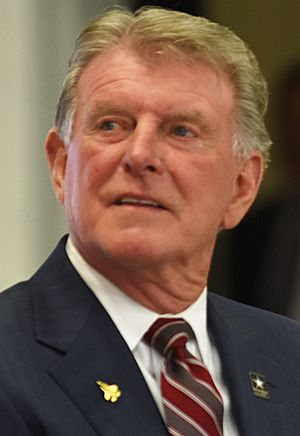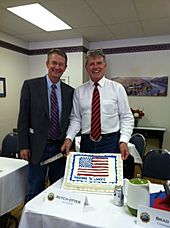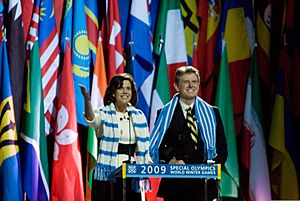Butch Otter facts for kids
Quick facts for kids
Butch Otter
|
|
|---|---|

Otter in 2017
|
|
| 32nd Governor of Idaho | |
| In office January 1, 2007 – January 7, 2019 |
|
| Lieutenant | Jim Risch Brad Little |
| Preceded by | Jim Risch |
| Succeeded by | Brad Little |
| Member of the U.S. House of Representatives from Idaho's 1st district |
|
| In office January 3, 2001 – January 1, 2007 |
|
| Preceded by | Helen Chenoweth-Hage |
| Succeeded by | Bill Sali |
| 37th Lieutenant Governor of Idaho | |
| In office January 5, 1987 – January 3, 2001 |
|
| Governor | Cecil Andrus Phil Batt Dirk Kempthorne |
| Preceded by | David Leroy |
| Succeeded by | Jack Riggs |
| Member of the Idaho House of Representatives |
|
| In office December 1, 1972 – December 1, 1976 |
|
| Personal details | |
| Born |
Clement Leroy Otter
May 3, 1942 Caldwell, Idaho, U.S. |
| Political party | Republican |
| Spouses |
Gay Simplot
(m. 1964; div. 1992)Lori Easley
(m. 2006) |
| Children | 4 |
| Education | College of Idaho (BA) |
| Signature | |
| Military service | |
| Allegiance | |
| Branch/service | |
| Years of service | 1968–1973 |
| Unit | Idaho Army National Guard |
Clement Leroy "Butch" Otter, born on May 3, 1942, is an American businessman and politician. He served as the 32nd Governor of Idaho from 2007 to 2019. He is a member of the Republican Party.
Before becoming governor, Otter was the Lieutenant Governor from 1987 to 2001. He also served in the U.S. Congress for Idaho's first district from 2001 to 2007.
Contents
Early Life and Education
Butch Otter was born in Caldwell, Idaho. His parents were Regina Mary and Joseph Bernard Otter. His father was an electrician. His family moved often, and he attended many different schools as a child.
His nickname "Butch" came from some minor bruises he got as a kid. Nuns at his Catholic school first called him "Clem." He graduated from St. Teresa's Academy in Boise in 1962. He was twenty years old when he finished high school. He worked as a janitor, theater usher, and lawn boy during high school.
Otter went to St. Martin's College briefly. Then he attended Boise Junior College. He earned his Bachelor of Arts degree in political science from the College of Idaho in 1967. He was the first in his family to graduate from college.
Business Career
Butch Otter worked for thirty years at Simplot International. This is a large agribusiness company. It was founded by his former father-in-law, J.R. Simplot. Otter started in a basic job and eventually became the company's president.
Early Political Career
Serving in the Idaho Legislature
Otter first ran for public office in 1972. He won a seat in the state legislature from Canyon County. He was re-elected to the House in 1974. He served in the state legislature until 1976.
Running for Governor in 1978
In 1977, the Democratic Governor Cecil Andrus became the U.S. Secretary of Interior. Lieutenant Governor John Evans took over as governor. Otter announced in June 1977 that he would run for governor in 1978.
In the Republican primary election, Otter finished third. Allan Larsen won the nomination. John Evans won the general election.
State Politics and National Roles
After his run for governor, Otter stayed involved in politics. He was on the Idaho Republican Party Central Committee. He also chaired the Canyon County Republican Party.
When Ronald Reagan became president in 1980, he appointed Otter to several groups. These included a task force on international business and an advisory committee for the World Bank.
Lieutenant Governor of Idaho
In 1986, Otter returned to Idaho politics. He was elected lieutenant governor. He was re-elected three more times in 1990, 1994, and 1998. He worked with three different governors during his time as lieutenant governor.
In 1991, the Idaho Senate had an equal number of Republicans and Democrats. Otter's tie-breaking votes helped the Republican Party keep control. He served for 14 years, making him the longest-serving lieutenant governor in Idaho history. He resigned in 2001 to become a U.S. Congressman.
U.S. House of Representatives
Congressional Elections
When Otter ran for Congress, he was already well-known as lieutenant governor. He easily won the Republican primary election. He also won the general election in November. He was re-elected in 2002 and 2004.
Time in Congress
In Congress, Otter was mostly conservative. He also had some libertarian views. For example, he voted against the Patriot Act in 2001. He was one of only three Republicans to do so.
Later, he said that parts of the Patriot Act were needed for safety. He also criticized the Bush Administration's program for watching communications outside the United States.
Views on Key Issues
- Marriage: He supported a constitutional amendment to define marriage as between "one man and one woman."
- Gun Laws: He strongly supported Second Amendment rights. He was against federal limits on gun sales.
- Economy: He voted for a bankruptcy law in 2001 that required some debt repayment. He supported a balanced budget amendment for the U.S. Constitution. He also wanted broad tax cuts, including removing estate and marriage taxes.
- Foreign Policy: Otter voted to allow the 2003 invasion of Iraq.
Committee Work
While in the U.S. House, Otter served on several important committees:
- U.S. House Committee on Resources
- U.S. House Committee on Transportation and Infrastructure
- U.S. House Committee on Government Reform
- U.S. House Committee on Energy and Commerce
Governor of Idaho

2006 Election for Governor
In December 2005, Otter announced he would run for governor in 2006. He won the Republican primary with 70% of the vote. In the general election, he ran against Democrat Jerry Brady.
Otter was expected to win easily because he was popular and Idaho is a strong Republican state. However, the race became much closer than expected. In the end, Otter won the election with 53% of the vote. This was the closest gubernatorial race in Idaho since 1994.
First Term as Governor
As governor, Otter suggested increasing Idaho's education funding. He also supported expanding scholarships for college students. He wanted to increase offshore oil drilling. He also supported tax breaks for developing alternative fuels. He set a goal for the U.S. to get 25% of its energy from renewable sources by 2025.
In 2007, Otter supported a plan to reduce the number of gray wolves in Idaho. He said he would be among the first to buy a hunting tag for a wolf. This idea was criticized by environmental groups.
In 2007, actress Dawn Wells gave Governor Otter the Idaho Visionary Award. This was for his support of filmmakers in Idaho.
2010 Election and Second Term
Otter ran for re-election in 2010. He won the Republican primary with 55% of the vote. In the general election, he defeated Democratic candidate Keith Allred with 59% of the vote.
He began his second term on January 7, 2011. He proposed changes to teacher employment rules. He signed bills that limited teachers' ability to bargain for contracts. These laws also changed how new teachers earned permanent positions. However, these laws were later overturned by voters in 2012.
In April 2011, Otter issued an order. It stopped Idaho state agencies from putting the federal Patient Protection and Affordable Care Act into action.
In 2013, a private prison company, Corrections Corporation of America (CCA), admitted to falsifying records. This involved employee hours at the Idaho State Correctional Center. An audit later showed even more overbilling. Otter ordered an investigation. In 2014, Idaho took over the prison's operations from the company.
In March 2014, Otter created the "Wolf Control Fund and State Board." This continued his policy of managing wolf populations in Idaho.
2014 Election and Third Term
In November 2014, Otter was elected to his third term as governor.
During his third term, a bill to legalize CBD oil for severe epilepsy passed the Idaho Legislature. However, Otter vetoed the bill in April 2015. He stated that it ignored scientific testing and went against federal law. He also worried about potential misuse.
For the 2016 presidential election, Otter supported fellow Republican John Kasich.
In May 2016, CCA (now called CoreCivic) was found to have not followed a court order. The company had assigned too few staff to the Idaho State Correctional Institution. They also submitted false reports to appear compliant.
In July 2017, Otter joined other Republican Attorneys General. They threatened to sue the Donald Trump administration. They wanted the president to end the Deferred Action for Childhood Arrivals policy.
In January 2019, the Idaho Republican Party criticized Otter. This was because he supported an independent candidate over a Republican candidate in a local election.
Personal Life
In 1964, Otter married Gay Simplot. She is the daughter of J. R. Simplot. They divorced in 1992 after 28 years of marriage.
In 2006, Otter married his longtime girlfriend Lori Easley. She was a former Miss Idaho USA. They married in Meridian on August 18.
Images for kids
See also
 In Spanish: Butch Otter para niños
In Spanish: Butch Otter para niños
 | William Lucy |
 | Charles Hayes |
 | Cleveland Robinson |


